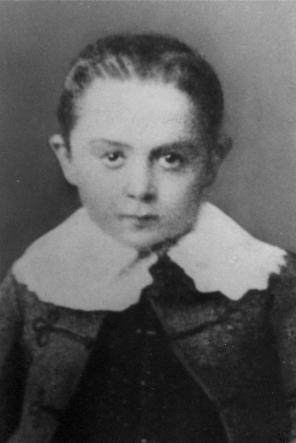
Viteles before entering Penn

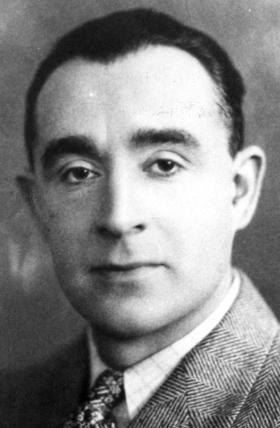
He majored in history, but took enough psychology to get into graduate school at Penn. Viteles received his Ph.D. in 1921, with Witmer as his advisor. Witmer arranged for a section of the Psychological Clinic to be set up under Viteles' direction, concerned with vocational guidance, in 1922.
An early contribution to the field of vocational guidance was the publication in 1938 of Vocational Guidance Throughout the World, in which Dr. Viteles described the state of the field based on his extensive international contacts and professional knowledge of developments in all parts of the world.
From early in his career, Viteles espoused a broad international view, Dr. George said. Spending a year in Europe on an American Field Service Fellowship in 1922-1923), he later went to the Soviet Union as a Social Science Research Fellow (1934-1935), and played an early and continuing role in the International Association of Applied Psychology, of which he was president from 1958 to 1968. He became an honorary member of the Italian Society of Scientific Psychology, the Spanish Psychological Society, and the Psychological Society of France. He was also a member of the National Institute of Industrial Psychology of Great Britain.
At home, he served as Chair of the Consulting Division of the American Psychological Association and president of the Pennsylvania Psychological Association, and was active in the American Association for the Advancement of Science, the Industrial Relations Research Association, and Training Directors of America.
Dr. Viteles modeled the role of the scientist-practitioner long before the American Psychological Association adopted the concept as a role model for psychology, Dr. George said. "Throughout his long career at the University, he was able to combine a full-time professorship involving research, teaching, and student mentoring with a staff position at the Philadelphia Electric Company as Director of Personnel Research and Training. Neither role was slighted. In fact, he used this dual role to demonstrate the effective interaction of science and profession and of research and practice."
During World War II, he applied his scientific knowledge and professional skills to research and practice in the armed forces, chairing the National Research Council Committee on Aviation Psychology; supervising research projects for the National Defense Research Committee, and serving as consultant to the War Manpower Commission, the U.S. Navy, and the U.S. Air Force.
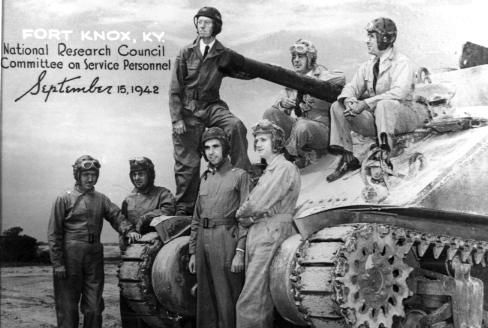 Viteles on a tank
Viteles on a tank
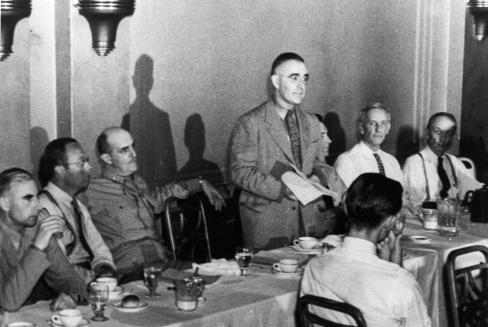 Viteles addressing National Research Council
Viteles addressing National Research Council
After several years of annual summaries of the literature on industrial psychology for the Psychological Bulletin, in 1932 at the age of 34, Viteles published Industrial Psychology. This monumental book not only established him as a leader in the field, but also helped define the growing field. So influential was the book that some people later regarded him as the founder of the field, but Viteles himself credited Hugo Münsterberg with that role. Nevertheless, /Industrial Psychology/ continued to be considered the "Bible of Industrial Psychology" for many years. When Viteles planned to update it after World War II, he began by revising the original 15 pages on "Motivation in Industry" and ended up with a new 500-page volume in 1953 entitled Motivation and Morale in Industry. That book became another "Bible" in its subject. His own practitioner role was a model. Not only did he engage in careful research and application in the "real world," but he published his findings in both practitioner and scientific journals. The success of his consulting roles is evidenced by the scope and duration of his consulting relationships. For example:
In recognition of his distinguished contributions, the American Psychological Foundation in 1988 granted him its Psychological Professional Gold Medal Award.
There is much more one could say about Viteles, but who could say it better than Morris himself? He wrote two autobiographies that are remarkably insightful, namely:
Viteles, M. S. (1967). Morris S. Viteles. In E. G. Boring & G. Lindzey (Eds.), A history of psychology in autobiography (Vol. 5, pp. 417-500). New York: Appleton-Century-Crofts.
Viteles, M.S. (1974). Industrial psychology: Reminiscences of an academic moonlighter. In T. Krawiec (Ed.), The psychologists (Vol. 2, pp. 441-500). New York: Oxford University Press.
Each of them not only deals with Viteles as a person and as a psychologist, but also serves to provide valuable information about the development of psychology as a science and profession.
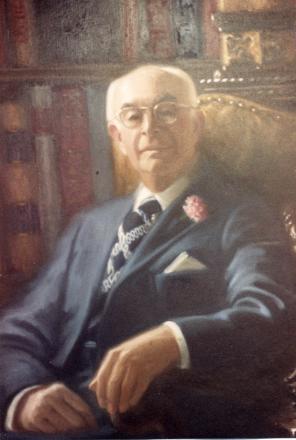 Viteles as Dean
Viteles as Dean